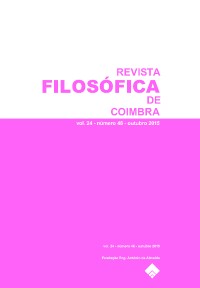Please use this identifier to cite or link to this item:
https://hdl.handle.net/10316.2/91891| Title: | Leitura fenomenológica do texto medieval: a fauna de um país longínquo ou um pensamento universalmente singular? | Authors: | Barbosa, Diogo Morais | Keywords: | medieval philosophy text;phenomenological thinking;fauna of a distant country;universally singular judgment;Augustine;texto de filosofia medieval;leitura fenomenológica;fauna de um país longínquo;pensamento universalmente singular;Agostinho | Issue Date: | 2015 | Publisher: | Imprensa da Universidade de Coimbra | Abstract: | Para alguns leitores, o texto de filosofia medieval é visto como o império das bizantinices. São muitos os leitores para os quais aquele tipo de textos não tem peso na (ou, em todo o caso, não interessa para a) vida normal e corrente do homem contemporâneo. Isto é tanto mais assim na medida em que os próprios medievalistas insistem em seguir uma determinada linha interpretativa, pautada por notas bem concretas e por contornos bem delimitados. De facto, os estudiosos tendem a lançar‑se no empreendimento de filosofia medieval como quem explora «a fauna de um país longínquo», para adotar a expressão de Merleau‑Ponty. Este artigo desenvolve‑se em dois momentos: no primeiro, é apresentado o modelo da fauna; e, no segundo, procura‑se mostrar que a leitura fenomenológica do texto medieval assenta num outro modelo, que pode ser designado como «pensamento universalmente singular». Ao longo do artigo, toma‑se como exemplo o corpus augustinianum. For some readers, the spirit of medieval philosophy most often falls within the scope of Byzantinology. Conceptually, since medievalists insist on following a particular interpretative line of reasoning, which is marked by well‑defined and delimited thoughts, this perspective advocates that such texts are of limited value for day‑to‑day life in the modern world. In fact, while using a Merleau‑Ponty’s terminology, scholars tend to launch themselves in the venture of medieval philosophy as if they intended to «explore fauna of a distant country». This article is structured in two distinct sections: in the first section we deal with the model underlying the notion of fauna and then, in the second section, we intend to demonstrate that the phenomenological approach to medieval text is based on another template; one that can be designated as «universally singular judgment». The corpus augustinianum is used throughout the article as an example. |
URI: | https://hdl.handle.net/10316.2/42824 | ISSN: | 0872-0851 | DOI: | 10.14195/0872-0851_48_1 | Rights: | open access |
| Appears in Collections: | Revista Filosófica de Coimbra |
Files in This Item:
| File | Description | Size | Format | |
|---|---|---|---|---|
| leitura_fenomenologica_do_texto_medieval.pdf | 979.99 kB | Adobe PDF |  |
Items in DSpace are protected by copyright, with all rights reserved, unless otherwise indicated.
